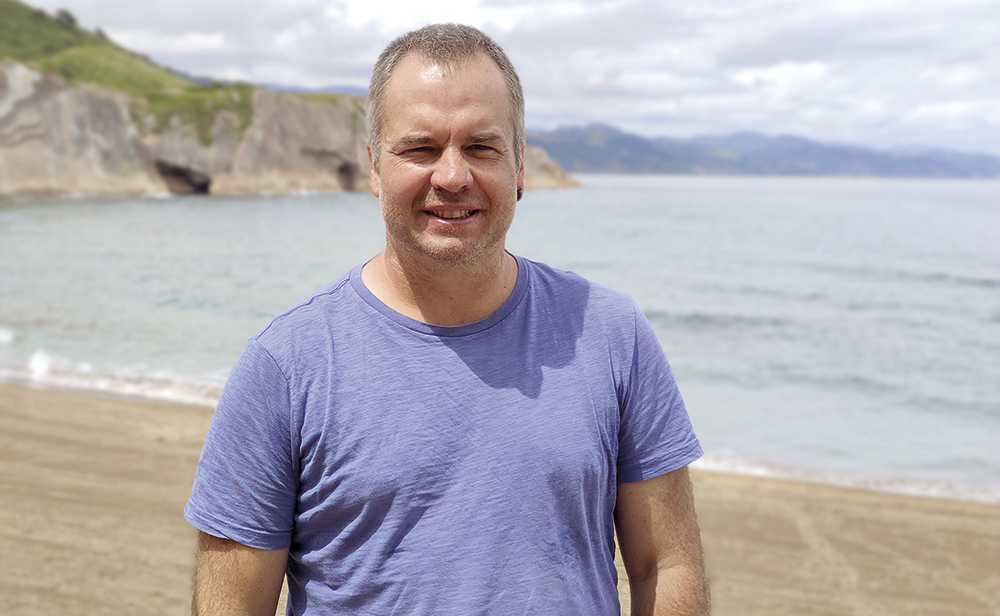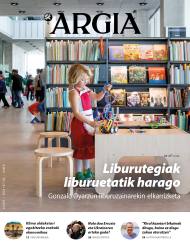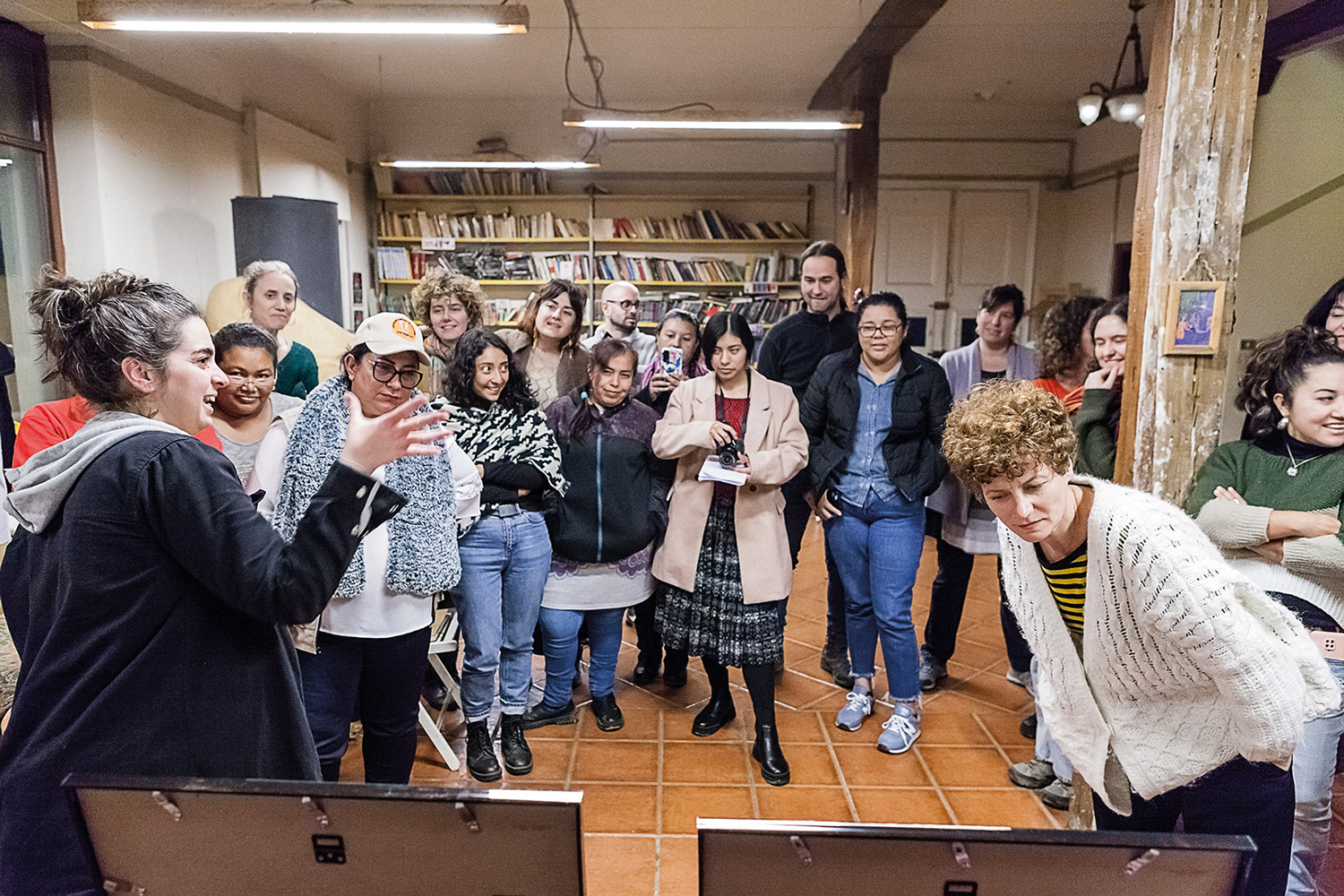"A cultural sector looks at sport with contempt and does not seem to me to be a practical attitude"
- The corner of sports journalism is well known by Aitor Manterola (Zumaia, 1975). He has been writing for years in the Berria newspaper, especially rowing and football. Last year he decided to “finish the race” leaving behind “a nice beard” and has now started playing in the field of politics, occupying the position of councillor in the City Hall of Zumaia. It has made the passion for sport a playful style as a journalist, but also seriously, because sport is more than just a game: “It has a huge force in society and cannot be disregarded.” In this regard, he believes that the Basque media should be more courageous. “We have good sports journalists, but we don’t squeeze them out.”

They say that we must not confuse politics and sport. You will be a councillor in the City of Zumaia in the next four years, and sport will be one of your responsibilities.
I believe that the people are more than political. I live my whole life in the village. In the world of sport I was part of the rowing club directive for eight years and I have also been a football coach. On the other hand, I have worked in Euskera and dance groups. I would put the work of the City Hall in that bag.
He says you are now in “external beacons.” For many years he has been in the turbulent waters of sports journalism.
Yes, and what beautiful years have been! I started around 2009 with Igor Susaeta. He wrote rowing in Berria, and with him I started the road. It has been an incredible experience that the rowing world lived as a journalist and I have created very good personal relationships over all these years. Leaving this behind gives me a lot of pain, even if the relationships are still there.
You're passionate about football and you've had the opportunity to capture that passion on paper. But has he left any more trace?
As a journalist, yes, because it has given me more opportunity to relate closer. Moreover, I have written more rowing, which has allowed me to reach more people. Rowing people have always been willing to help me in everything. And as a journalist, I've given a lot of importance to relationships.
Is this closeness generally sought for other interests?
I don't know. At least my case has not been. Journalism, I don't see it that way. I've tried to do things with my heart. And I've always been clear that journalists are a bridge that connects the news or the protagonist with the reader or society. The protagonists are not us. Give some news first, I don’t know what… I haven’t obsessed with that. As far as signing is concerned, I gave some firstfruits, but always with respect and asking the athletes.
Sport is entertainment for many. A great theater organized around the results.
Sometimes it seems to be vital. And the result is only valid. There is no choice but to lose or win. Losing is a failure, and after winning, you go to heaven. It's a really bad educational model. Processes are not taken into account. Winning should not be an objective, but a consequence. There is a way to get there. It requires important pedagogical work. But it's useless. In an environment of constant crispation. Let's break the fires on. There we have a lot of responsibility for journalists.
Does it agree with those who regard sport as collective anesthesia?
It cannot be denied that elites use sport to entertain people. With society’s reflections on sport, people are not angry at the injustices we live in. However, we always blame the manipulator, but it is the responsibility of the individual not to be manipulated. Let's reflect, what am I giving so much importance to a sporting outcome? Always respecting the feeling and adherence to a group.
Sport has been devoured by monetary passion, and hence the rejection of many.
It is clear that in larger sports too much money moves. I am not in favour. But we are not going to change anything behind the scenes. If we change it, we change it inside.
Feeling part of that circus has caused you internal conflicts as a sports journalist?
Sometimes yes. “As the world is, how am I here?” I’ve gone through my head. But I turned it around. I have realized that it makes no sense to underestimate or disregard sport.
Most journalists have spent years in print. What makes writing special as expression?
You can play with language and experiment. You put yourself in front of a page or white screen, which you can fill as you like. It's the best way to get what I have inside. Before, when I wasn't comfortable with myself or had a problem, I used to release knots in writing. For me it has a magical meaning.
“We are in an environment of constant crispation. Let's break the fires on. There we have a lot of responsibility for journalists”
In sport does the journalist have more freedom than in other departments to play with language?
The sports department may not be that rigid, and yes, it gives you that possibility. But whenever you master the issue you have to deal with. I always tell what happened to me with the rowing. I’ve seen rowing since I was a kid, but I understand… When I started rowing on the news, I gave very basic data: the differences between the boats in the law firms, and so on. But I really wanted to learn, and I was absorbing new information. So my articles evolved a lot.
You've also written from the knowledge of football, which is a longtime coach.
Understanding gives you another confidence and freedom when you get in front of your computer. And I think that this is also the responsibility of the journalist. Football is an excuse not to talk about football. That was what Gaizka Garitano once said and he was right. You don't talk about the game, or very little. And I think journalists have to explain the game. But to do so we must understand it. I got all the coach titles, and as a journalist, I tried to convey to the readers what I learned.
Therefore, sport tends to be treated lightly. Is this an irrelevant issue?
Sport has an enormous force in society. Of course, how many people move from small towns? It cannot be underestimated. I'm going to generalize, but here in Euskal Herria, a cultural sector looks at sport with contempt. It does not seem to me to be a practical attitude. Instead of discarding anything, we're going to combine things in urbanism. At local and national level, sport is an enormous tool for working equality, inclusion and social cohesion. Team sport, to me, is a metaphor for life that serves to internalize values like collaboration and respect. It is a way of combating the individualistic tendency of society. It also makes it possible to guarantee the use of Euskera outside school.
Is it also useful for national construction?
Of course. Unfortunately, little is being used in this respect. Big football clubs, for example, do not dare. They say they don't want to leave their partners. But at the same time they give more space to Spanish than to Basque. They do not remember the Basque partners there. In the case of politics, they are very careful. Around them they have Spanish media, they play in the Spanish League… They have the hand brake. Furthermore, I believe that clubs should further promote the influence of athletes in conveying educational messages to society.
Has sports journalism changed a lot since you started?
On the one hand, we are now looking for more morbid than before. The news isn't, and that's a big deal. No one has forced me to put my finger in an unnecessary place to get readers. But this style exists. We have got worse in this regard, although some sports media are emerging that make respectable journalism. Unfortunately, conditions are precarious in private media in Basque. It is a desire and it cannot. There are not enough resources. Readers are missing.
.jpg)
Why are sports content not read in Basque?
General situations affect the Basque people. On the other hand, perhaps there is a lack of courage in the products. We will be betting on sport. Eñaut Barandiaran, Iñaki Berastegi and the three essays with Harmaila magazine. We saw that long-breathing journalism was not working in sports. We published a series of numbers, a hundred numbered pages. We also won the ARGIA Prize. But the pandemic came. We started losing subscriptions and no longer met the requirements for access to government subsidies. If we moved on, we had nothing clear about where we were going to go. It was hard work, and we started collecting the money. We finally gave up. But the vacuum is there. Being so fond of sport, it is worth offering this group a product in Basque.
What diagnosis would you make of sports journalism in Basque?
We have excellent professionals, but we don't squeeze them out. As a society, we don't value what kind of sports journalists we have. And I will say this as a constructive criticism: neither in media projects do we succeed in taking advantage of that potential.
What are the worst aspects of distance?
On the one hand, I should like to refer to the difficulties that the teams have in making a relationship between journalists and athletes in major sports. They don't see us as a bridge. And then the stress is also there. Everyday journalism has its own rush. In the case of sports journalism, with the evenings chronicles you know you're sick if you're early. This affects the quality of work. This quick work is fine, but then you have to turn it around. If you don't, it can be dangerous. However, it is a wonderful profession. The sports journalist will feel me to death and I do not rule out coming back.
Paternalism has taken on current journalism. Maybe he had kidnapped him a long time ago. This nostalgia gene continues in the trade, elevating all the achievements of the past. Anyone can know our awards: partiality, sensationalism, the heart press and many more. Because a large... [+]
Berrian lan egiten duen kazetariak, Euskal Telebistaz liburua idatzi berri du Txoria hodei artean, ETB lehen eta gero. Galdera batekin abiatzen du liburua kazetariak: 40 urte bete dituen Euskal Telebistak behar den gisan arrapostu ematen al dio euskal jendartearen egungo... [+]












